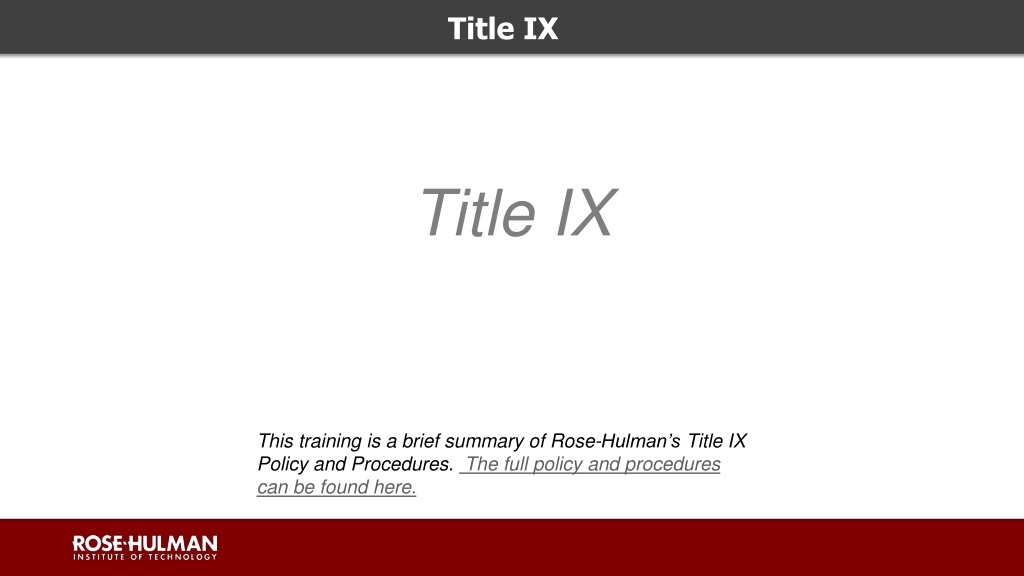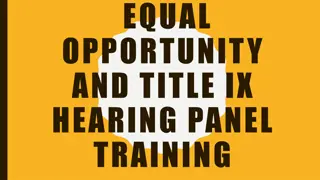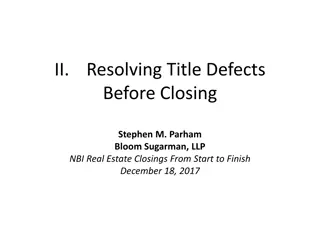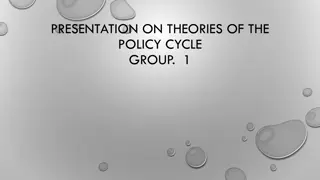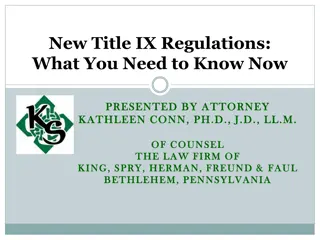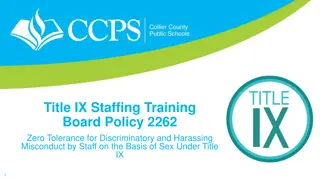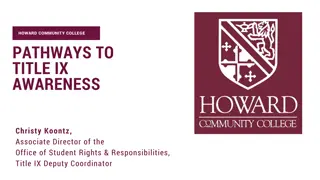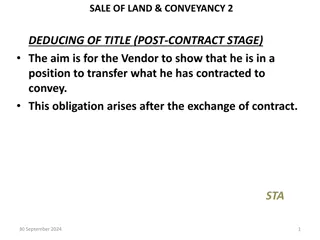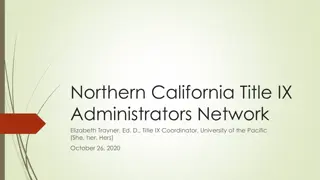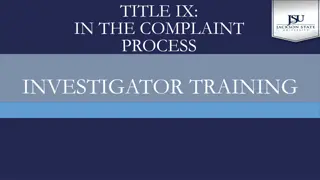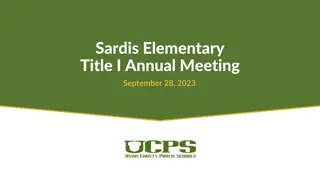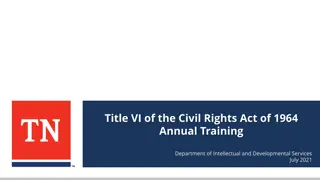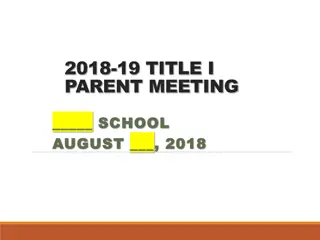Understanding Title IX Policy and Procedures
This brief training provides an overview of Rose-Hulman's Title IX Policy and Procedures, outlining the background and significance of Title IX, conditions for filing a formal complaint, roles of mandatory reporters, and the process upon receiving a report of alleged sexual harassment.
Download Presentation

Please find below an Image/Link to download the presentation.
The content on the website is provided AS IS for your information and personal use only. It may not be sold, licensed, or shared on other websites without obtaining consent from the author. Download presentation by click this link. If you encounter any issues during the download, it is possible that the publisher has removed the file from their server.
E N D
Presentation Transcript
Title IX Title IX This training is a brief summary of Rose-Hulman s Title IX Policy and Procedures. The full policy and procedures can be found here.
What is Title IX Title IX is a federal civil rights law passed as part of the Education Amendments of 1972. This law protects people from discrimination based on sex in education programs or activities that receive Federal financial assistance. Title IX states: No person in the United States shall, on the basis of sex, be excluded from participation in, be denied the benefits of, or be subjected to discrimination under any education program or activity receiving Federal financial assistance. Title IX regulations recognize that sexual harassment, including sexual assault, is unlawful sex discrimination.
Conditions Formal Title IX Complaint The following conditions must be met to qualify for a formal Title IX Complaint. The conduct must meet the legal definition of sexual harassment. The conduct must occur within the context of an educational program or activity for which the Institute has jurisdiction over the Respondent. The conduct must occur in the United States. The Complainant must be a student at Rose or attempting to attend Rose. The Title IX Coordinator is required to dismiss the reported grievance if allegations do not meet Title IX conditions. However, dismissal does not preclude action under other policies such as student conduct, faculty handbook, staff handbook etc.
Mandatory Reporters Students have a choice! Federal guidelines encourage schools to respect the autonomy of Complainants to allow them some control over when and if alleged sexual harassment is reported and investigated. If a student or employee chooses to inform any of the following mandatory reporters of allegations of sexual harassment, the mandatory reporter must report the allegations to the Title IX Coordinator. The Title IX Coordinator Vice President of Student Affairs and Dean of Students Vice President for Human and Environmental Services The Ombudsperson Committee All employees in a supervisory role are mandatory reporters of complaints made by employees under their supervision.
When A Report is Received Upon receiving notice of an alleged sexual harassment, the Title IX Coordinator will: Contact the Complainant to discuss the availability of supportive measures. Consider the Complainant s wishes with respect to supportive measures. A student may receive supportive measures irrespective of whether the student files a formal complaint which encourages students to report sexual harassment while allowing them to exercise some control over their report. Explain to the Complainant the process of filing a Formal Complaint.
Supportive Measures Examples of Supportive Measures include, but are not limited to: Consultation with Public Safety or local law enforcement Rescheduling academic assignments or tests Moving to another course section Adjusting housing arrangements Referral to counseling or other health services Mutual No Contact Orders The Complainant can choose to accept or not accept supportive measures. Supportive measures are free of charge. Respondents in a formal complaint/investigation also receive supportive measures.
Filing a Formal Complaint A formal complaint is REQUIRED by federal law before Rose-Hulman can investigate an allegation of sexual assault. If a student informs us of an incident, but chooses to not file a formal complaint, in most circumstances we cannot proceed. The Title IX Coordinator can sign a complaint and initiate an investigation. However, we will only do that if there is a serious threat to the safety of the campus community. We will not force a complaining party to engage in the process, except under extreme circumstances.
Basic Requirements of the Investigation Interview Complainant and Respondent these interviews typically last one to two hours Identify all possible witnesses eyewitnesses, friends, and roommates Interview all possible witnesses Gather additional evidence text messages, social media, campus video surveillance, ID access records Follow-up interviews
Basic Requirements of the Investigation The typical case includes at least 6-10 interviews. We have interviewed as many as 30 students for one investigation. Under the current process, Kristen and Holly conduct all interviews together. Detailed notes of each interview are taken, and most interviews are recorded with student permission. Discuss and evaluate. Do we need more information? Are there other people to interview? Has new evidence surfaced that we need to request?
Alcohol: Investigative Challenges Lack of memory Inability to give detail Person may have been unconscious or in and out of consciousness Delay in reporting because: May not know the event occurred May not recognize it as lack of consent Feeling of contributory negligence Concerns over conduct policy consequences Delays in reporting create challenges for the investigation. We may be asking a student about events that occurred more than a year prior and while they were intoxicated.
Get Detailed Information Timeframe of consumption (first drink, last drink, spacing) Number of drinks For each drink: Type (beer, wine, liquor specific brand if possible) Was it mixed with anything? Who mixed it? How was it served? List of others present and when they were there Behaviors of parties that may help evaluate intoxication vs. incapacitation Other factors that affect impact of alcohol: Food consumed before, during, and after the alleged incident, height and weight, medications, different sleep patterns, illness, low hydration, history of blackout.
Get Detailed Information Other information that can establish timeline, assist in assessing level of impairment, and can provide corroboration of either party s account: History of relationship between the parties Witness s knowledge of Complainant s sober behavior Parties communications or interactions with each other (compare pre- and post-incident) Parties descriptions of the incident to others context, content, demeanor Text/social media messages sent before, during, and after the incident
Gathering Evidence and Creating Investigative Report The burden of proof and the burden of gathering evidence rests on Rose-Hulman and not on the parties. Our goal in these investigations is not to prove or disprove that something occurred. Our goal is to gather all possible evidence to increase the likelihood of finding the truth. The investigators prepare a report that summarizes all interviews and evidence gathered. These reports are typically 15-30 pages in length. The reports are provided to the parties, and they are given the opportunity to respond in writing. They often have private lawyers helping them through the process.
Investigative Report: Findings Final decisions on Title IX cases are made by Erik Hayes (for students) and Megan Elliott (for employees). For students, Erik reviews the report and determines whether he feels that any additional information is needed. He often conducts his own interviews with both students to ask additional questions. Erik meets with the students and lets them know his thoughts on the case. If the students agree with his conclusions, the case is resolved and closed. If the students disagree, they have a right to a full hearing and presentation of evidence. The majority of cases end without a hearing, by the choice of the students.
Preponderance of the Evidence Various ways to describe the standard: More likely to be true than not. More probable than not. The greater the weight of the evidence. Tipping the scale ever so slightly. 51% The standard is NOT beyond a reasonable doubt or clear and convincing evidence these are criminal standards. There must be something to tip the scale. It must be more than the Complainant s story vs. the Respondent s story.
CHALLENGES TO TITLE IX Alcohol 90%+ of all cases Private nature of incidents Mental Health Delay in Reporting
Challenges at Rose-Hulman Misuse of terminology Not understanding the definitions and parameters set forth by the OCR and DOE Inability to defend the process due to FERPA and privacy concerns Rumors, hearsay, game of telephone Inaccurate and incomplete information
Challenges at Rose-Hulman Be considerate of your friend s privacy: do not share their story. Know your resources and connect your friend to them. Be supportive and not judgmental. Remember, coming to Kristen or Kyle to talk and ask questions does not initiate an investigation *. If you don t know what to do, ask someone. If you feel something is off , tell someone. We cannot do anything about information we do not have.
